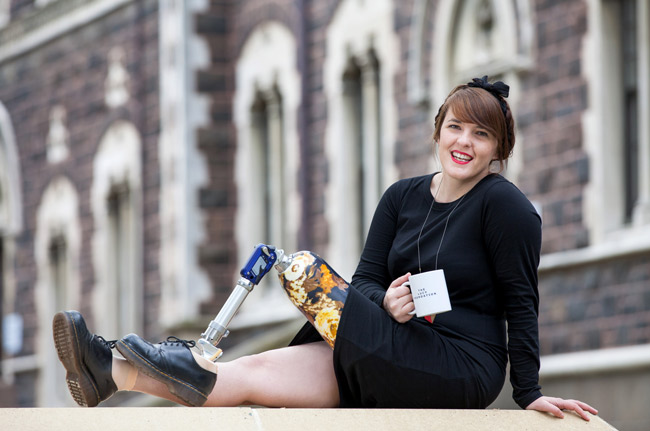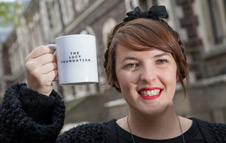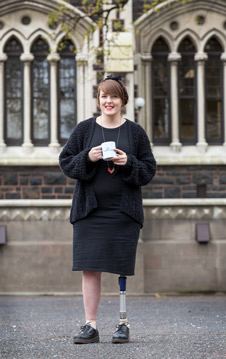
PhD student Robbie Francis. Photos: Sharron Bennett.
After witnessing first-hand the human rights abuses suffered by people with disabilities in countries of conflict, PhD candidate of the National Peace and Conflict Centre Robbie Francis established a social enterprise coffee business in Mexico specifically inclusive of people with disabilities.
Ms Francis found a unique way to connect her studies on conflict resolution and peace building with her passion for humanitarian efforts, disability rights and coffee. Now, she hopes her business model becomes a game-changer in the social enterprise world and encourages more businesses to become disability inclusive.
The 27-year-old student launched The Lucy Foundation in 2014 after coming across human rights abuses. She could not forget the memories from her first trip to Mexico as an intern with Disability Rights International, and that it spurred her to think of ways she could help.
The Lucy Foundation empowers people with disabilities by working with local communities to encourage the employment and education of people with disabilities, and promote disability-inclusive business models.

The Lucy Foundation is currently working with a non-governmental organisation supporting disabled people and their families in Oaxaca, Mexico, to create a sustainable, organic coffee business that is disability inclusive.
Ms Francis explains that people with disabilities all over the world are often denied opportunities to be trained, educated and employed. After that initial trip to Mexico in 2013, she started to plan how she could create a business strategy that supported and employed people with disabilities.
“What if we could create an entire production line of coffee that is inclusive of people with disabilities from seed to cup?”
The Lucy Foundation's coffee business is currently in the harvesting stage, and Ms Francis is already planning an expansion after a successful year of fundraising to get the project off the ground. “This is a new way of thinking,” she said, “and I want to find out how we can do this on a bigger, more sustainable level.”
The origins of the Lucy Foundation
Born with phocomelia, a condition that meant the bones in one of her legs did not grow from birth, Ms Francis learned to walk with a prosthetic leg.
She said as a child she nicknamed her leg Lucy, and it was only fitting that the foundation she created to support people with disabilities be named after it.
The impetus for starting a social enterprise foundation came from a conversation with the late Donna-Rose McKay, who at the time was the Head of the University's Disability Information and Support.
"For so much of my childhood, my disability was my weakness, but now it's become my strength."
Discussing Ms Francis' completed Master's degree in peace building and conflict studies, Ms McKay mentioned how negatively people with disabilities are treated in conflict areas and how little literature there was around this issue.
Ms Francis said in researching, she came across a photograph of a wheelchair lying in a pile of rubble in a bombing area, and realised she could no longer ignore it. “This is my community,” she said, “and I need to respond.”
After finishing her master's degree at Otago University, she said it was an easy decision to continue at Otago with her PhD after being encouraged by Professor Richard Jackson and Professor Kevin Clements at the National Centre for Peace and Conflict Studies.
Ms Francis chose to focus her research on ensuring that the voice of disability is present in peace and conflict studies, and analysing the policies, devices, and attitudes that ensure the resilience and well-being of disabled people in conflict areas.
While the focus of her PhD exists separately to the work of The Lucy Foundation, both are driven by her passion to serve the global disability community.
Ms Francis emphasises the role of the Lucy Foundation in Mexico as an equal partner and “dot-connector” with the local organisations and their New Zealand buyer, and that she is “driven by human rights,” not business.
The future

Ms Francis will finish her PhD in early 2018, and she has big plans for continuing her work. She aims to become a leader in the social enterprise business, promoting ways to be inclusive of people with disabilities.
She hopes that the coffee business becomes self-sustainable in five years, and she is excited to plan goals for future projects with different products and countries.
She states that if other businesses take her unique business model and use it to create their own sustainable business she will have achieved something to be proud of.
And she's not finished with academia just yet; she wants to encourage academic discussion in all faculties about ways to ensure processes, research, methodologies and literature are universally accessible to people with disabilities.
Ms Francis acknowledges the privilege and support she had growing up with her disability, and wants to use her life experience and extensive studies to help other people living with disability, in both the local and wider communities.
“For so much of my childhood, my disability was my weakness, but now it's become my strength.”
